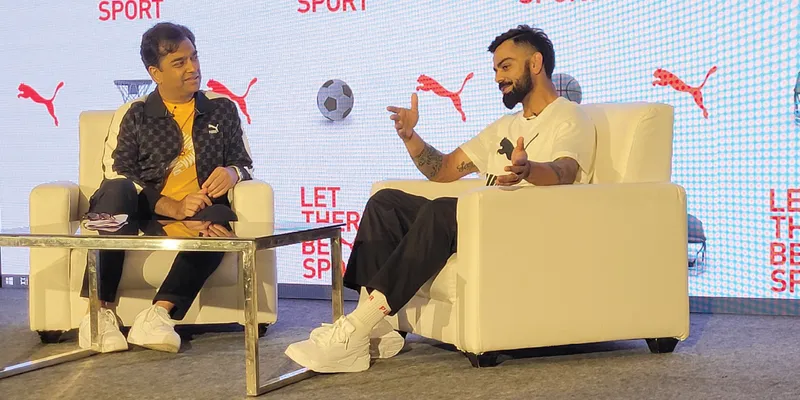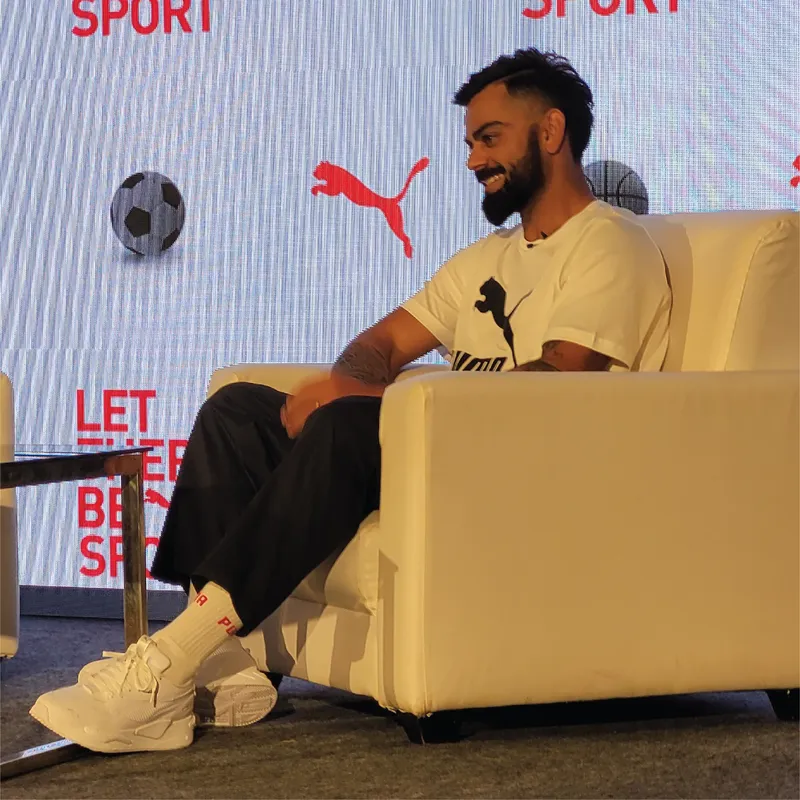Sunil Chhetri, Virat Kohli on the power of sports in our daily lives
At the ‘Let There Be Sport’ conclave organised by PUMA India, former Indian cricket captain Virat Kohli and national football skipper Sunil Chhetri discussed why sports and studies should go hand-in-hand.
Growing up, most of us would have constantly been told to focus on our academics than sports. Conventional careers like engineering, medicine, and civil services have been considered more stable than making a living out of sports.
However, it is sports that teach us the basic life skills—teamwork, resilience, and to never give up. Sports shape our lives in more ways than we realise.
“Sports would be the first thing to drop in class 8 because board exams are coming in a couple of years…We’ve all gone through that. But sports is never a digression,” said Abhishek Ganguly, Managing Director, PUMA India and Southeast Asia, at the Let There Be Sport conclave organised by PUMA India in Bengaluru on Friday.
Ganguly was joined by former captain of the Indian cricket team, Virat Kohli, and captain of the Indian football team, Sunil Chhetri, on a fireside chat to discuss the importance of sports in children’s lives.
Going down memory lane, Chettri said, “When I was young, sports was not a choice… Everything around us was in some way or the other related to sports. Apne ghare me toh ye normal hai, aise hi hota hai. (It was normal in our house). Only when you notice other kids, you realise it’s different.” He added that only when he grew up did he value being born into a family that gave importance to sports.

Sunil Chettri during a fireside chat with Abhishek Ganguly of PUMA India
According to a survey conducted by PUMA India and Nielsen Sports, only 20% of urban Indian adults meet the WHO-recommended 150 minutes or more of physical exercise weekly, while for children, an average of only 86 minutes of the recommended weekly 420 minutes of fitness.
The survey, conducted across 16 cities, with 4,280 respondents aged between 18-65 years of age (including parents of kids aged between 6-18), also found a direct correlation between kids with high sports participation and improved academic performance.
“In sports, you have to think fast. It is not just about the body; anyone can be physically fit. But being smart in that split second is the real deal… Sports people may not open a book of biology and study. That is a different aspect. But if they do, they will understand and grasp it much faster. If you are smarter, if you are quick, you will learn things quicker,” Chhetri added.

Virat Kohli with Abhishek Ganguly of PUMA India
Kohli, whose board marksheet is making the rounds on the internet—where he wrote, “Let there be sport,” and added, “it’s funny how the things that add the least to your marksheet, add the most to your character”—shared that cricket was always a part of his life.
It was some of his neighbours who discovered Kohli’s talent and urged his father to enrol him in cricket. Kohli played cricket throughout his school and later got into the West Delhi Cricket Academy.
“I was pretty decent in studies, except for maths. I just could not understand maths. I’m scared of how I am going to teach anything to my daughter!” he laughed.

Virat Kohli
“I did not have enough time to do maths. But when I focused on it, I was pretty good. So, I never had trouble at school, never bunked classes,” said Kohli as he took a quick trip down memory lane.
After completing school, Kohli decided to pursue cricket full-time. “My father asked me if I was absolutely serious about cricket. He did not play with words or instructed me ‘Yeh sab chodo and padhai karo (leave cricket aside and study)’,” Kohli recalled.
Kohli was determined about cricket, and it was then that his father asked him to focus all his attention on the sport. “I was lucky that I got that support from him,” he said.
PUMA India’s survey also reports that both kids and adults cited ‘lack of time’ as the primary barrier to participating in sports and physical activities, followed by other challenges such as lack of facilities and high cost.
Further, the report also suggests that kids in Eastern India spent most of their time playing sports and fitness (125 minutes per week), compared to Western India at lowest average (68 minutes).

Sunil Chhetri
Chhetri said, “India is a huge country and holds the limitless potential to become a global sporting superpower. However, for that to happen, we need to promote participation in sports and fitness right from the grassroots level by treating it as an essential habit of daily life instead of narrowing it down to a hobby.”
Kohli also pointed out that some people take up sports as an excuse to not study. “If you are not absolutely sure of whether sports is a career option for you, then focus on your studies… I’ve seen many people use sports as an excuse. Today, they are neither here nor there. One has to be honest with themselves and ask if they are absolutely willing to give attention to sports. If things don’t work out, what’s the Plan B?”
Speaking about his learnings from sports, Kohli said that it has taught him to take risks. “When you are under pressure while playing the game, you need to decide what is good for the game and the team and jump on that decision. This requires enough practice and consistent work on a daily basis to believe in yourself to make that decision in a split second and act on it,” he said.
Interestingly, the survey found out that more females (42%) participated in sports and fitness-related activities on a daily basis than males (36%). The survey also showed that adults with high sports participation are likely to exhibit more positive emotions than others.
“Sports impacts millions of people all over the world in a powerful way and is capable of positively influencing one’s attitude,” Chhetri said, as he urged everyone to make playing and exercising a part of their daily life.
(The story was updated with additional images.)
Edited by Megha Reddy







